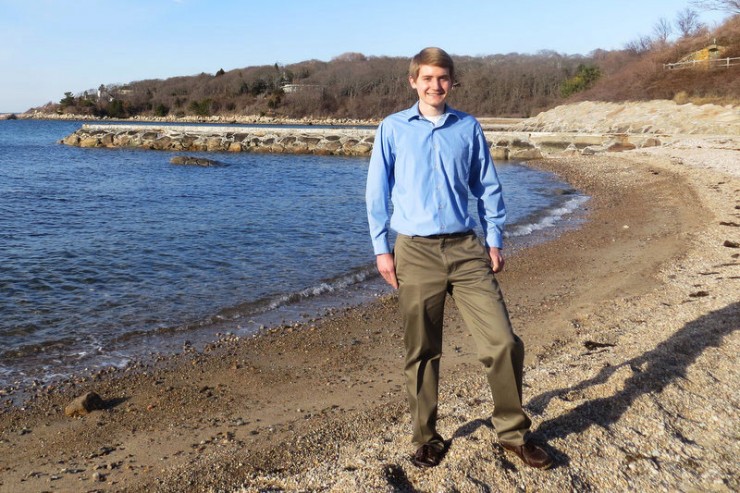by Greg St. Martin
Benjamin Moran, S’18, a marine biology major, has been awarded the Ernest F. Hollings Scholarship by the National Oceanic and Atmospheric Administration.
The scholarship supports students interested in oceanic and atmospheric science, research, technology, and education, and includes a two-year academic stipend as well as a 10-week paid summer internship working under the guidance of a NOAA mentor on a research project of the recipient’s choosing. Moran was one of 150 students nationwide to receive the scholarship this year.
He is conflicted on whether he wants his project to focus on molecular biology or ecology and fisheries science, so he may decide to simply not make a choice. “I might try to tie those two together,” he said. “I have a hard time finding things I’m not interested in.”
On Thursday afternoon at Northeastern, Moran will be recognized for earning his scholarship at the university’s Academic Honors Convocation.
He has already amassed a variety of research experiences in his first two years at Northeastern. In his first year, he worked on a bioinformatics project as part of a research team’s work to assemble a de novo central nervous system transcriptome of the brown ghost knifefish. Since then, he has won a Scholars Independent Research Fellowship for a project in biology professor William Detrich’s lab studying a blood gene found in an Antarctic icefish, and he’s also expanded his interests into public policy through a project working with associate professor Jon Grabowski at Northeastern’s Marine Science Center. That research involves examining the processes, trends, and outcomes when local fisheries apply for federal disaster relief and when the government issues disaster declarations.
Moran is currently on co-op at the Marine Biological Laboratory in Woods Hole, Massachusetts, where he is part of a team whose research focuses on rotifers, a tiny marine invertebrate. His co-op began by setting up experiments that test how rotifers respond to different environmental cues and then track changes in their lifespan and reproduction. But he’s since been asked to help to create a DNA library for some rotifer samples.
“I’ve had as many experiences as I could ask for and more at Northeastern to pursue all of my interests,” Moran said.
Though he grew up in Ohio, far from the Atlantic and Pacific oceans, Moran noted that he’s always “had a fascination with things that were different,” particularly ocean life. This passion—sparked from experiences like reading Jacques Cousteau books and visiting aquariums—blossomed in high school when he took introductory courses for college credit on oceanography and aquatic biology at summer programs at Ohio State University’s Stone Laboratory, located on Lake Erie. There, he got his first hands-on experiences with field ecology, collecting specimens, and learning about marine processes.
“It confirmed on a larger level that this is what I want to do with my life,” said Moran, adding that Northeastern’s marine science curriculum and hands-on experiential learning opportunities played a big role in his choosing to attend the university.
Once Moran completes his co-op in June, he is planning to continue working on his research with Grabowski—and no doubt uncover new areas of marine science that pique his interest. He will also begin Northeastern’s Three Seas Program next spring.
He aspires to earn a doctorate in biological oceanography or marine biology. “Marine science is extremely interdisciplinary,” he said. “The more I learn, the more I want to tie things together as I advance in my career.”

